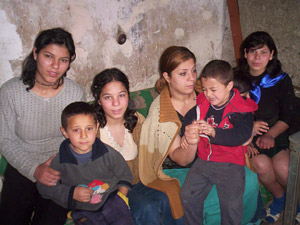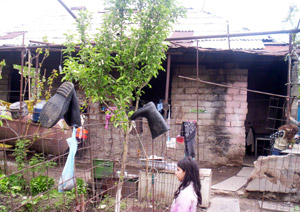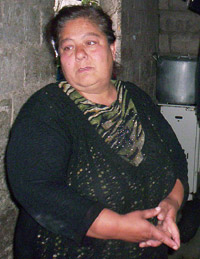Didn’t have shoes to go to school
Former Russian language typist for the “Yerkhimshintrest” factory Susanna Gevorgyan is currently 50 years old and is raising her 11 children. She says that her children are her only treasures. The mother of eleven says the names of the doll-face girls and the boys shy of the camera.
“This is Ani, this is Heghine, she’s Arpine, this is my son Vartan, this one…”she gets confused and starts over.
“I can’t even think straight because there is so much to worry about. There are so many problems that I even forget my kids’ names. I can’t go and get a check-up. I am not well. If I to go to the doctor, they’re just going to cut me up and put me back together.”
Four of the eleven children go to school and currently study at a night-school because they get nutrition there. While studying at the middle school, they used to come home and sleep without any food.
“I took them out of the public school because I had no other choice; I couldn’t make it. Now at least I know that they are eating at the night-school. My children study well, but what else could I do? Do you know how hard it was for me at first? I was suffering a lot, I missed them. They only come home on Saturdays and Sundays, but I have gotten used to it. What can I do? We had no other choice. I barely get to feed them and let’s not even talk about clothes,” says Susanna crying as she remembers the days when she didn’t send her 4th and 8th grade girls to school because they didn’t have any shoes to wear. Principal of the night-school Karine Muradyan started getting worried over their absence and when she called Susanna to see why her children weren’t coming, Susanna got red and was ashamed to tell her the truth.
“I don’t like to cry and am ashamed of such things. I didn’t tell her that they don’t have shoes to wear.”
Then, when the students finally went to school after a long absence, they couldn’t hide the fact and told the principal that they didn’t have any shoes to wear.
“You have no idea what a wonderful woman she is. As soon as she found out about that, she took my girls, went to the store and bought shoes for them. It’s amazing to see that these kinds of people actually exist in our country today,” says the mother of eleven, who although raises her children in poverty, however says that she always sends her children clean-cut and dressed to school. Susanna remembers ten years ago when the government gave her multi-member family a car as a present, but back then there weren’t that many kids in the house.
“My husband and I were overwhelmed. We felt like we had actually done something good for our homeland and got rewarded for that. You know, it was easier to take care of the children back then, we had no worries, we were happy, but during the past couple of years having lots of kids became a risk factor, it’s very hard. If we just manage to solve the problem with keeping food on the table, we won’t worry over anything. We are a great and loving family.”
But the family sold the “08” brand name car given to the family as a present years ago in order to buy some cows so that the children could at least drink milk. After a while, when Susanna’s husband suffered a heart attack, they sold the cows to pay for the hospital expenses. Her husband Melsik can’t work because of the heart attack, but Mrs. Susanna mainly worries over her children’s education. She places high emphasis on that. They call their 4th grade student Heghine the prosecutor at home because she loves to ask a lot of questions and reveal the truth through those questions. She used to dream of becoming a prosecutor, but now when she has found out what “bribes” she must give just to get accepted in the law department of the university, she is desperate. She no longer dreams of that. She says:
“Who will accept someone studying at a night-school in the law department anyway?”
The mother, on the other hand, believes that things will get better and that her daughter Heghine will move from a night-school to a regular one. Heghine learns how to make a rug so that she can later help her family out.
People have turned cruel
 Susanna has four boys, who are getting ready for army enlistment one after another. Susanna, who was born in Nakhijevan, is worried over the restart of a war because she has spent her childhood in Nakhijevan with the Azerbaijani. She says that the hatred between Armenia and Azerbaijan is absurd because Armenians and Azerbaijani were like one big family back in the days.
Susanna has four boys, who are getting ready for army enlistment one after another. Susanna, who was born in Nakhijevan, is worried over the restart of a war because she has spent her childhood in Nakhijevan with the Azerbaijani. She says that the hatred between Armenia and Azerbaijan is absurd because Armenians and Azerbaijani were like one big family back in the days.
“True, they are a little scared, but I haven’t seen their bad sides.”
She came to Nakhijevan at the age of 15 and remembers seeing Armenians and Azerbaijani getting married regardless of religion.
“I remember they had some kind of ritual day. On that day, there couldn’t be any music, and the Armenians respected their beliefs and there weren’t any conflicts. We are all getting along well. They are a good people; it’s just that we have suddenly become enemies. I don’t remember one Azerbaijani who has done something bad to the Armenian people back in the days when there was peace. When the youth of that generation used to get married with one another, the parents were usually against the marriage and accused their children of changing their beliefs. I remember how one of our friends got married with an Azerbaijani, changed her religion, and went to the Azerbaijani church. The father forgot about her and didn’t accept his own child. Whenever one of the neighbors was in need, regardless of their nationality, they used to lend a helping hand. There was love, respect.”
She says that times have changed-people have turned cruel and are cold-hearted. Armenians consider Azerbaijani as blood-thirsty, while Armenians are often the ones going at each other’s throats. There is no morality. For example, hundreds of benevolent organizations give tons of help to the needy, but multi-member families, like Susanna’s, have starving sons going to the army, while the sons of families taking advantage of the help given don’t go to the army. But despite all this, the mother of eleven is proud that her sons will help defend the homeland.
The needy give their votes
 Everyone knows about this multi-member family living in the outskirts of Charbakh, Yerevan, but many consider Susanna and Melsik as heroes and simply extraordinary for giving birth to 11 children in hard times like these. In 1993, the Armenian government gave this family a car as a present. Now, when life has gotten harder for them, the parents don’t know how they can save their kids from starving. Mrs. Susanna has asked the village head of Charbakh Samvel Sharoyan for help. She says that Sharoyan simply eats up all the money, instead of saving it at the village council and always rejects Susanna, claiming that he will not have enough money for his family later.
Everyone knows about this multi-member family living in the outskirts of Charbakh, Yerevan, but many consider Susanna and Melsik as heroes and simply extraordinary for giving birth to 11 children in hard times like these. In 1993, the Armenian government gave this family a car as a present. Now, when life has gotten harder for them, the parents don’t know how they can save their kids from starving. Mrs. Susanna has asked the village head of Charbakh Samvel Sharoyan for help. She says that Sharoyan simply eats up all the money, instead of saving it at the village council and always rejects Susanna, claiming that he will not have enough money for his family later.
“I don’t ask him for help anymore because it’s a waste of time to make him care for us. We are the only multi-member family in the village. If they are not helping us, who will they help? If we only get to see the village head during the elections, what good is he for? He was elected village head three years ago, but he hasn’t paid attention to anyone or done any good deed.”
The family isn’t even qualified to get a “Paros” state subsidy because some of the children are no longer minors. The residents of the village in Charbakh assure that nobody pays any attention to the family and they too complain about the village head and the indifference of MP and member of the “Rule of Law” party Gagik Avetisyan. They claim that the two only remember the people during elections. They add that the “Rule of Law” helps people by calling on them to become members of the party.
“Many villagers have become members because the party hands out presents during holidays. They give gifts on April 7th and attract the public eye. It’s like they’re doing that so the people will vote for them. The people are poor and they go ahead and do that just to get something out of it,” say the residents.
Susanna and her family don’t take advantage of the “goods” offered and prefer not to satisfy their needs by giving votes. Susanna’s neighbor’s young son has died and the mother dressed in black says that she has difficulty going to the cemetery due to the fact that the road is in a terrible condition. She has asked the MP and the village head to asphalt the road, but she hasn’t gotten any reply.

